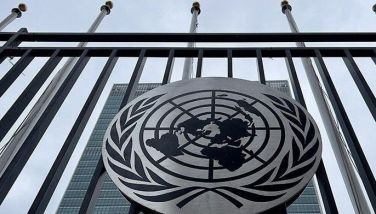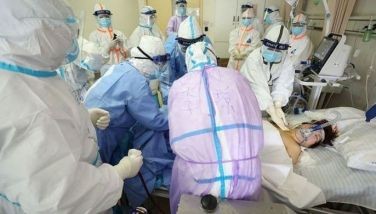UN team visits Iran exile camp hit by killings
BAGHDAD — A United Nations team on yesterday visited a contentious Iranian dissident camp in Iraq where multiple residents were killed the previous day in unclear circumstances, as the Iraqi government pledged to launch a probe into the bloodshed.
The facts of what happened at Camp Ashraf are in dispute, including the number of those killed and how they died.
Supporters of the roughly 100 exiles who had been living at the Saddam Hussein-era facility northeast of Baghdad allege that 52 people were killed in violence it blamed on Iraqi security forces, and that another seven were taken hostage.
Iraqi officials have provided lower death tolls and have given different accounts of what happened, with some saying the bloodshed began with infighting among camp members, members of the Mujahedeen-e-Khalq group.
The UN team was expected to return to Baghdad later yesterday, according to UN spokeswoman Eliana Nabaa.
The visit was intended to be "on humanitarian grounds, to assess where we can assist," she said. The UN mission does not have a mandate to conduct a formal investigation, and it is not clear what, if any, findings the UN plans to release.
Iraqi Prime Minister Nouri al-Maliki announced that his government was setting up a special committee to conduct its own investigation of what happened at Camp Ashraf, about 95 kilometers (60 miles) northeast of Baghdad.
A statement issued by al-Maliki's office said the Iraqi government is committed to ensuring the safety of people living within its borders, although it also "stressed the necessity of transferring the MEK members who are staying in Iraq illegally."
The UN, the United States and Britain have avoided assigning blame for the attack, but have condemned the violence at Camp Ashraf and urged Baghdad to ensure the security of the remaining Ashraf residents.
The MEK opposes Iran's clerical regime and until last year was labeled a terrorist group by the United States. It carried out a series of bombings and assassinations against Iran's clerical regime in the 1980s and fought alongside Iraqi forces in the 1980-88 Iran-Iraq war. Several thousand of its members were granted sanctuary inside Iraq by Saddam.
The group officially renounced violence in 2001, and US troops disarmed MEK members at the camp following the invasion of Iraq in 2003.
Camp Ashraf was home to more than 3,000 MEK members until last year, when most residents were transferred to a former US military base near Baghdad.
The Baghdad camp, known as Camp Liberty, is meant to be a temporary way station while the UN works to resettle the exiles abroad. It has been repeatedly targeted by militants in rocket attacks that have killed 10 people and injured many more, according to the MEK.
Iraq's current Shiite-led government, which has strengthened ties with neighboring Shiite powerhouse Iran, considers the MEK's presence in Iraq illegal and wants to expel its followers.
The resettlement process has been slow because the UN has had difficulty securing commitments from member states to accept the exiles and because some of them are reluctant to be separated from their comrades.
At least 162 MEK members have been resettled abroad so far, mostly in Albania.
- Latest
- Trending

































